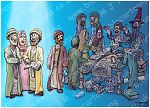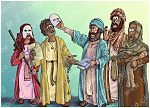Bible Cartoon: <-- 2 Timothy : Titus -->
Click on Add to cart button below shopping cart.
Purchased Bible Cartoons do not have watermarks. Links to Cartoons provided on email once purchase is completed.Titus
Book type: Letter (Epistle)
Author: Apostle Paul
No. of chapters: 3
Key character(s): God, Jesus, Paul, Titus [1]
Brief description: Titus – The minister’s guide.
01) Greeting & Introduction (1:1-4)
02) Minister’s prime/central task (1:5-9)
03) Ministers reveal false teachers & teaching (1:10-16)
04) Ministers bring on & train new leaders (2:1-15)
05) Christians have moral & community duties/responsibilities (3:1-11)
06) Final remarks & blessing (3:12-15)
Records are incomplete but it is thought that the church at Crete was not started by the apostle Paul. He visited there with Titus, to strengthen & encourage the new church. Paul left the young man Titus at the church in Crete to finish the work there.
Paul‘s letter to Titus, the young leader of the church in Crete, was sent to encourage him to lead clearly & boldly in the church.
Theological conclusions.
The apostle Paul explains the strong theological foundations which underpin every church leader:
01) Jesus Christ – God & Saviour. Christian hope comes from his expected return (2:13). He is redeemer (2:14). We are heirs of eternal life through him (3:5-7).
02) Salvation – comes to imperfect people (3:3), through grace (2:11) from God in kindness, love & mercy (3:4-5).
03) The Christian life. Prime role of leaders is teaching, using sound doctrine (2:1) which is taught in age-appropriate words to the various member groups of the church congregation (2:2-10). Christians should avoid living like nonbelievers; instead living devoted lives of doing good (3:8,14).
04) Church leaders. Jesus is the great leader of the church, but he operates through human representatives: church congregational leaders. Elders should be appointed (1:5) who meet high moral standards (1:6-9) & who lead the church to do good (3:14). The purpose of good leaders & leadership is to silence the ungodly, rebellious, false teachers (1:10-16). False teachers lead people into unproductive thoughts & meaningless discussions (3:9-10) which are for dishonest personal gain (1:11).
Contemporary teaching.
The Bible declares salvation comes to us by God’s grace & not by our works or efforts, as does this book of Titus. Salvation is a gift from God, not a “right” we ern, yet this error of thinking & acting as if our efforts somehow gain our salvation is a perennial danger to human thinking.
Church leaders need sound doctrine to direct their own lives in Godly ways, & to help shepherd the church “flock” in that direction as well. Sound doctrine also assists them in refuting the lies of false teachers who may approach the church from outside or from inside.
Key Verses:
Titus 1:7-9 (ANIV)
Since an overseer manages God’s household, he must be blameless-not overbearing, not quick-tempered, not given to drunkenness, not violent, not pursuing dishonest gain. Rather, he must be hospitable, one who loves what is good, who is self-controlled, upright, holy and disciplined. He must hold firmly to the trustworthy message as it has been taught, so that he can encourage others by sound doctrine and refute those who oppose it.
Titus 2:11-14 (ANIV)
For the grace of God has appeared that offers salvation to all people. It teaches us to say “No” to ungodliness and worldly passions, and to live self-controlled, upright and godly lives in this present age, while we wait for the blessed hope-the appearing of the glory of our great God and Savior, Jesus Christ, who gave himself for us to redeem us from all wickedness and to purify for himself a people that are his very own, eager to do what is good.
Titus 3:1-2 (ANIV)
Remind the people to be subject to rulers and authorities, to be obedient, to be ready to do whatever is good, to slander no one, to be peaceable and considerate, and always to be gentle toward everyone.
Titus 3:9-11 (ANIV)
But avoid foolish controversies and genealogies and arguments and quarrels about the law, because these are unprofitable and useless. Warn a divisive person once, and then warn them a second time. After that, have nothing to do with them. You may be sure that such people are warped and sinful; they are self-condemned.
[1]
Fuller list of major characters in Titus:
| Name | Notes |
| Jesus | ”Saviour”. Christ means “the Anointed One”. (aka Jesus of Nazareth, The Christ, The Messiah, Son of man, Son of God). The central figure of the New Testament, whose life, death, and resurrection are chronicled in the 4 Gospel books. |
| Paul | (aka Saul, “Asked for” Hebrew.) Native of Tarsus, the capital of Cilicia, a Roman province in the south-east of Asia Minor. Jew with Roman citizenship; Pharisee; persecutor of the early Christian church. Converted from Judaism to Christianity after encounter with resurrected Jesus on the road to Damascus (Acts 9:1-30). Thereafter called an apostle (Ro 1:1, 1Co 1:1, 2Co 1:1, Gal 1:1, Eph 1:, Col 1:1, 1Ti 1:1, 2Ti 1:1, Tit 1:1). Author of at least 13 of the 27 books of the New Testament: Romans, Phillipians, 1 & 2 Timothy, 1 & 2 Corinthians, Colossians, Titus, 1 & 2 Thessalonians, Philemon, Galatians, Ephesians. |
| Titus | Τίτος, Títos “Honourable” “Pleasing”. One of Apostle Pauls’ converts; a Greek Christian. Apostle Paul’s companion and fellow-laborer on missionary work. Good, capable, trustworthy man.(2 Cor. 2:13; 2 Cor. 7:6, 13ff; 2 Cor. 8:6, 16, 23; 2 Cor. 12:18; Ga1:2:1, 3; 2 Tim. 4:10; Titus 1:4) |





